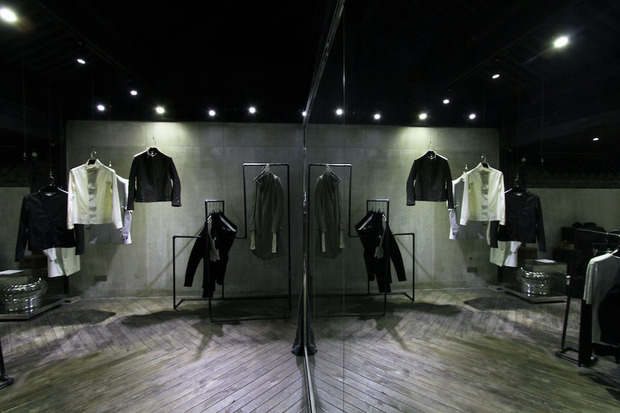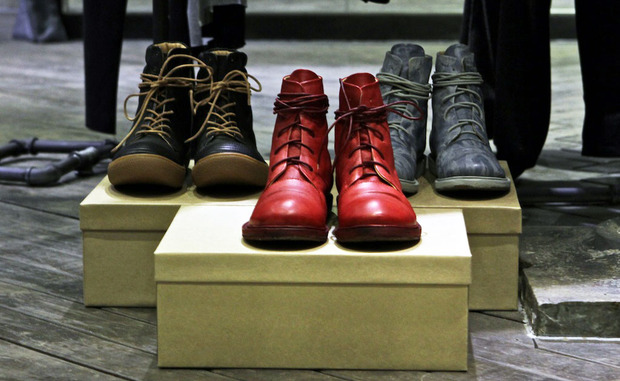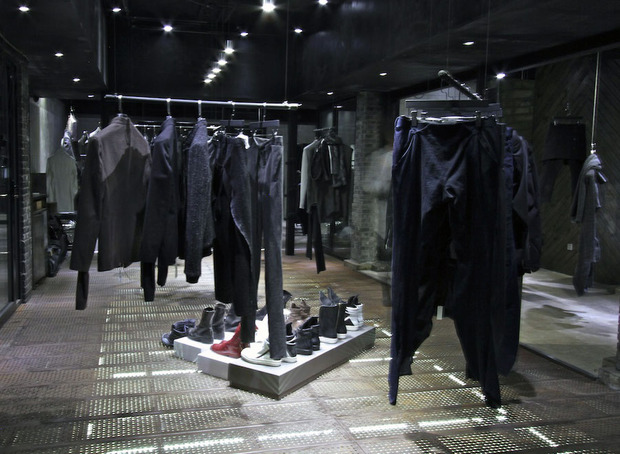Ink, Beijing
The Hong Kong-based men’s concept store brings its anti-commercial, underground yet high fashion labels to Beijing


It’s easy to imagine how important the concept of VIP is in a country where individuality is easily lost in an immense multitude of people. Among Chinese men, the older generations are still quite status-oriented and fashion is often simply a tool used to express power and wealth, while the younger generations—in the last 10 years—have become big spenders on street-inspired clothing, giving value to comfort and personality. Exclusivity is still a top priority; instead of gold Louis Vuitton lighters and shiny black Gucci loafers, the youngsters prefer LE sneakers, customized sportswear and racecars.
INK is a store, gallery and exhibition from Hong Kong that recently opened a space in Beijing. Located in an old hutong house and designed by Austrian architect Thomas Pucher, the space is a unique window on niche, anti-commercial labels in the world of high fashion: rigorously monochrome garments, with a strong design concept behind them, and outstanding quality.
INK’s significance within Beijing’s fashion scene is the fact that it’s one of the first places in the capital that researches anti-commercial brands for men, valuing understatement, craftsmanship, good quality and a deeper knowledge of the brand’s mission. Founder and owner Pita Cheng spends nights Skyping with designers, discussing new collections and is giving exclusivity a new meaning for the younger faces of Beijing. CH had the opportunity to interview Cheng about Ink’s concept and the move to Beijing.

Tell us a little about your background in fashion and art.
I grew up in a normal family and I fell in love with fashion when I was a kid. I started buying brands like Dolce & Gabbana, Comme des Garçons and Yohji Yamamoto when I was 13 years old—it was totally influenced by my very good childhood friend Eric Chu, the founder and designer of the brand called Ground-Zero; now presenting their Runway collection at Paris Women’s Fashion Week every season. Regarding opening my own store; I finished university in the UK and came back to Hong Kong in 2007. I worked in a different industry but I didn’t really enjoy it that much. Therefore I thought, “It’s time for me to leave” and started my own store in 2010.
What is the concept behind Ink?
The concept behind Ink is to provide the highest quality product to our customers and something totally different then fast fashion on the market nowadays. I don’t have any particular preference for selecting items as long as I think it can fit the image and concept of my store.
What is your target?
Actually I don’t really have any big target; I just want to share what I like with other people and my customers. Moreover, I just hope more and more people will appreciate the idea and story behind the product that they purchased and know about the culture and process of handcrafted work. Honestly, due to many uncertain factors, at this stage we just want to 100% focus on what we are doing right now and stop thinking or planning too far way. We strongly believe focusing on our own work is the only way to get better and better.

How did you decide to expand to Beijing?
Because I have many friends and customers from Beijing. From a business aspect, I think maybe Shanghai is more suitable to open a store like us but we think Beijing is more suitable for the culture—and we believe what we are doing has a really strong connection with culture.
Is there a difference in terms of taste and demand between Beijing and Hong Kong?
In terms of taste, I will say people in both places are quite the same but I would say mainland customers are more willing to accept new things and ideas.
What are the main brands and designers you work with?
At this moment in our Beijing store, we are working with many different designers. The main brands we are working with every season are Boris Bidjan Saberi, Guidi, Rick Owens and Label Under Construction. Some of them may not be so well-known because many of them are very small, but they prefer to spend all of their energy and power on their work.
Ink is located at 3 Andingmen Xidajie, Doncheng District, Beijing.
Photos by Alessandro De Toni












